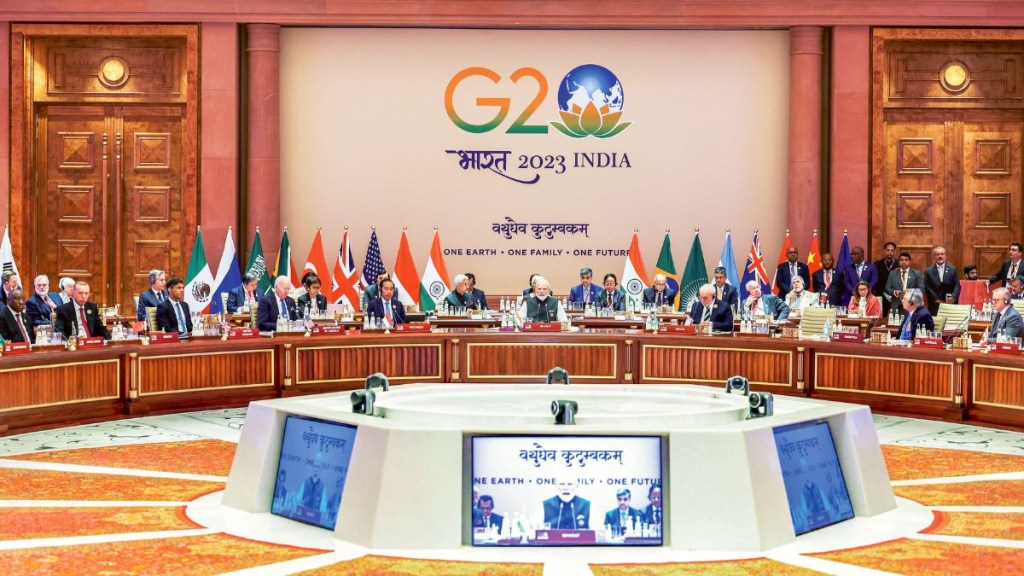By Rameesh Kailasam
Last November, I wrote in this newspaper that global crypto regulations appeared to be high on the G20 agenda and that India should use its presidency to direct discussions towards pragmatic regulation of Virtual Digital Assets (VDAs), in collaboration with other countries. Eleven months later, on September 7, 2023, the International Monetary Fund (IMF) and Financial Stability Board (FSB)’s published a synthesis paper on this. Under its G20 Presidency, India managed to expand the scope of discussions on crypto beyond financial stability to include broader macroeconomic implications, especially for emerging-market and developing economies.
The IMF-FSB paper covers several areas such as macrofinancial risks, investor protection, anti-money laundering (AML) and counter-terrorism financing (CTF), all of which had also been part of the Indiatech.org whitepapers released in 2021. The synthesis paper states that it was “at the request of the G20 Presidency that the IMF and the FSB have developed this paper to synthesise the IMF’s and the FSB’s (alongside SSBs’) policy recommendations and standards.” The paper lists the macroeconomic and financial stability implications of crypto, models of interaction and how the recommendations apply.
PM Narendra Modi had, at the WEF Annual Conference in January 2022, called for global cooperation for regulating crypto. During the G20 Summit, he further built on this position and sought global standards to regulate crypto. The G20 Leaders Declaration, adopted by consensus, stated that “We call for the swift implementation of the Crypto Asset Reporting Framework (“CARF”) and amendments to the CRS. We ask the Global Forum on Transparency and Exchange of Information for Tax Purposes to identify an appropriate and coordinated timeline to commence exchanges by relevant jurisdictions.” The declaration also blessed recommendations from the FSB for “regulation, supervision and oversight of crypto-assets activities and markets and of global stablecoin arrangements”. FMNirmala Sitharaman had also been advocating the need for setting up a framework for handling challenges related to crypto assets.
The G20 consensus on the implementation of the reporting framework for crypto indicates that most of the member nations want information exchange on such non-financial assets to start by 2027. Overall, the paper states the need for a comprehensive policy and regulatory action towards the response for crypto. This is necessary to address the risks of cryptos to macroeconomic and financial stability. It also seeks to address macroeconomic risks, jurisdictions, safeguards against excessive capital flow volatility, and adopt unambiguous tax treatments.
In case of new and emerging technologies, it is important for governments globally to view, adapt, constantly monitor, and learn to regulate the implementation and the players. The paper states that “Regulation and supervision of licensed or registered crypto-asset issuers and service providers can support the functioning of capital flow measures, fiscal and tax policies, and financial integrity requirements.” The paper also discusses aspects such as tools and resources to regulate crypto-asset activities, markets, crypto-asset issuers, service providers and the need for cross-border cooperation, coordination, and information sharing besides establishing strong governance and effective risk management systems. It also stresses on the need for transparent disclosures by crypto-asset issuers and service providers, on governance frameworks, operations, risk profiles and financial conditions apart from products, offers and activities undertaken.
Another recommendation by Indiatech.org in its 2021 paper was to consider a model of a registration/licensing structure for crypto asset service providers in India. Most countries including Japan and South Korea have instituted some form of licensing/registration processes for Virtual Asset Service Providers (VASPs) and institutions dealing with cryptos. This also forms the first step for the implementation of the OECD and FATF recommendations, and India should quickly move in this direction to institute such licensing/registration regime for this ecosystem.
Many of the G20 nations are increasing regulatory clarity on crypto. Brazil, which assumes the G20 presidency in December, already has a crypto-asset regulation place, including licensing of VASPs. While a comprehensive VDA regulation in India will evolve over time, the government has to start consultation with the industry on licensing VASPs, put guidelines in place, study the negative impact of high TDS on VDS and review the decision and encourage the industry to work on a self-regulatory organisation (SRO) mechanism.
There also needs to be a global consensus around taxation. While India’s crypto tax, TDS, prohibition of set-offs of losses, and limited accessibility to the banking system have discouraged transactions within India and its users from using domestic exchanges, reports suggest that the Indian users are still keen on investing, but have been pushed towards the lucrative overseas exchanges. Now, the action shifts to the meeting of the finance ministers and central bank governors in October 2023 on the sidelines of the annual meetings of the World Bank Group and IMF in Marrakech, Morocco. The discussions here will further parse through regulations based on the Synthesis Paper released by the FSB and IMF.
Rameesh Kailasam, CEO, indiatech.org
Views are personal
